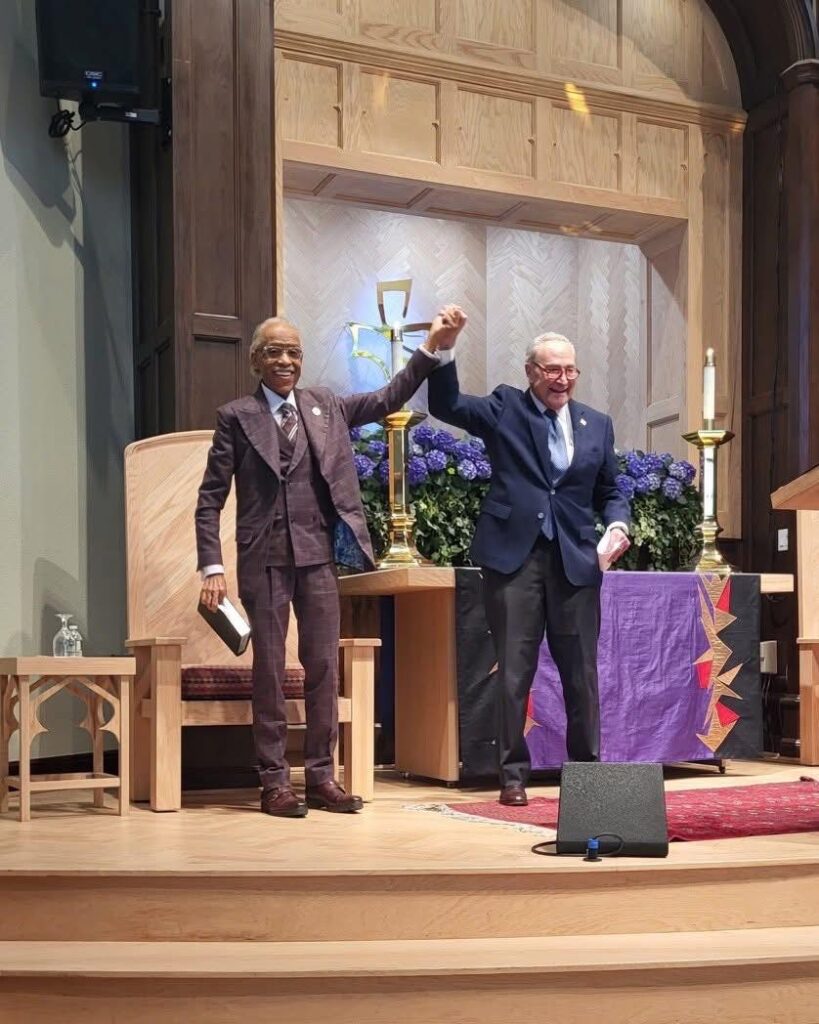
Rev. Al Sharpton and Senate Minority Leader Charles Schumer
By Dennis Richmond Jr.
It’s Jubilee Celebration Season at Grace Baptist Church in Mount Vernon, New York.
On Sunday, April 13th, 2025, the church was a living monument of faith, justice, and legacy. Attendees were in the crowd from Yonkers, Mount Vernon, the Bronx, and many other places too. Palm Sunday marked not only a celebration of Christ, but also the continuation of the 50th pastoral anniversary of Rev. Dr. W. Franklyn Richardson, a man revered not just in church, but across the nation.
The occasion brought together three major figures in American life: Rev. Al Sharpton, U.S. Senator Charles E. Schumer, and Rev. Dr. Richardson himself. After a powerful worship service, each leader reflected on their unique connections, shared missions, and urgent messages for today’s generation.
Rev. Sharpton delivered the Sunday sermon and I had the honor of sitting with him and Rev. Dr. Richardson after. “He’s an iconic figure in the Black church as well as in the nation,” Rev. Sharpton said about Rev. Dr. Richardson. “To see the outpouring of love and the recognition of the specific things he’s done is incredible.” But Sharpton’s message didn’t end with celebration—it pivoted into challenge. “We’re going back to what Adam Clayton Powell did in the ‘30s and what Dr. King did in the ‘50s—economic pressure,” he announced, referencing upcoming meetings with corporate leaders like PepsiCo. “You cannot enjoy our consumer dollars and then support policies and people that cut us out.”
Senator Chuck Schumer echoed those sentiments with warm admiration for Richardson when I spoke with him outside. “Dr. Richardson is one of the greatest people I’ve ever met,” Schumer said. “He’s made Grace Baptist one of the most influential churches in America.” Reflecting on their partnership during the COVID-19 pandemic, Schumer credited Richardson for helping secure federal relief for thousands of churches across the country. “He’s responsible for the preservation of thousands of churches,” Schumer stated. “He got us to do this.”
The day also served as a teachable moment for young people. Both Sharpton and Richardson urged the next generation to awaken to the threats facing their civil liberties. “Their generation will have fewer rights than ours if we don’t act,” Sharpton warned. “They’re going backward on voting, affirmative action, and DEI. We made our mark—this fight is for them.”
Rev. Dr. Richardson passionately agreed, saying, “Too many young people have not owned the depth of the sacrifices that our forebearers made. They woke up with privilege and have no idea what it took to get it.” To Richardson, today’s youth are “our salvation,” and they must understand what they’ve inherited.
In a moment of shared reflection, Richardson added, “Al Sharpton is the greatest civil rights leader in this time.” The two men’s bond was evident—not just in words, but in years of mutual service.
As our interview ended, the message was clear: this wasn’t just a conversation about a great pastor. It was a call to action. Palm Sunday at Grace Baptist wasn’t just about the past either—it was about preserving the future.





